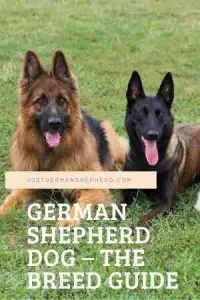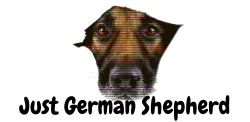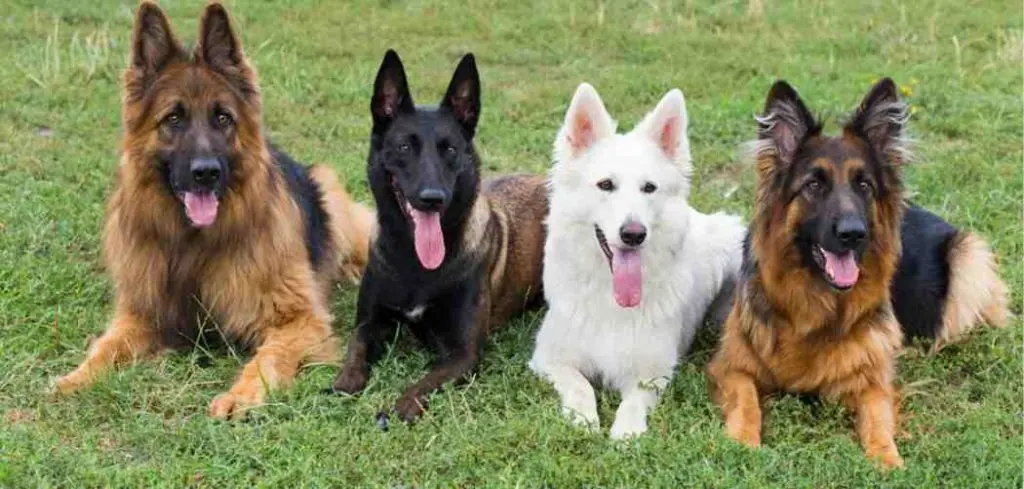
Table of Contents
German Shepherds Breed At A Glance
Size: Medium-Large
Weight Range: Male: 65-90 pounds, Female 50-70 pounds
Height: Male 24-26 inches, Female 22-24 inches
Lifespan: 9-14 years
AKC Classification: Herding
Exercise Requirements: Greater than 40minute a day
Energy Levels: Average
Drool Levels: Low
Snoring Levels: Low
Digging Levels: Low
Grooming Requirements: Medium
Litter Size: 5-10
Appearance
Naturally Upright Ears,
Medium Length course and dense double coat.
Typically Black and Tan however any color except White which is not recognized by AKC.
German Shepherd Breed History
As their name suggests German shepherds are a breed that originated in Germany. German Shepherds were developed as a breed by Captain Max von Stephanitz in the 1800s by crossbreeding various herding dogs, with stringent checks throughout this process the breed progressed quickly. Van Stephanitz spent 35 years promoting and refining the breed. The German Shepherd Dog (Or GSD for short) was known for years in the United Kingdom as the Alsatian due to concerns that the word German in the name would put a lot of prospective owners off due to the anti-German sentiment after World War I. The breed was not initially considered a pet more a servant for farmers, hence the term ‘Shepherd’ in the name.
The breed came to popularity in the United States thanks largely to the movie exploits and adventures of Rin-Tin-Tin, who was a puppy bought back to Los Angeles by Corporal Lee Duncan from a bombed-out kennel in France during World War I. Duncan training Rin-Tin-Tin and turned him into one of the most famous dogs ever in showbiz. At the height of their fame, Duncan and Rin-Tin-Tin were receiving over 10,000 pieces of fan mail every week.
By the time World War II arrived the GSD was the military service breed of choice. Used as messenger dogs, rescue dogs as well as unfortunately being trained to run at a tank with explosives tied to their back the GSD was a versatile companion throughout. It is estimated that more than a million dogs were killed during the Second World War, the vast majority of them being GSD’s.
Following the Second World War GSD’s popularity did suffer throughout America due to Anti-German sentiments at the time however as time progressed their popularity increased continually until 1993 when the German Shepherd broke back into the AKC Top 3 Most Popular Breeds where they have stayed ever since.
The German Shepherd Dogs popularity received a large boost in 2001 as they were seen as a national hero for their Search and Rescue work in the wreckage of the Twin Towers following 9/11. 2001 saw the breed move into the Top 2 of the AKC popularity list where they have remained ever since.
It is said that the modern America German Shepherd’s are calmer that their European counterparts who have continued to be subjected to stringent breed tests.
German Shepherd Personality
One of the most recognisable breeds in the world the German Shepherd, like most breeds that were bred for their herding ability is an active, faithful alert dog. The GSD is a typically reserved dog that is fiercely loyal when a bond is formed. The breed is considered smart and easy to train and are great for active families and families with children.
Typically, a German Shepherd will not have an aggressive temperament naturally and their gorgeous watchful eyes can often feel like they are assessing your every move. German Shepherds are excellent watchdogs and will protect children in their family without hesitation. In many ways the German Shepherd is very much the Alpha of the dog world, being courageous, calm, confident, intelligent, active, smart and loyal there isn’t many species that can come close.
German Shepherd Health
Germany Shepherds are typically a healthy breed however, like all breeds, German Shepherds are prone to some common diseases. The common health conditions a German Shepherd can suffer from are:
Hip and Elbow Dysplasia
Hip and Elbow dysplasia is a genetic disease caused when the hip and elbow joints suffer structural defects in the cartilage which causes a fair amount of wear and tear on the joints leading to eventual degradation of the joint.
Degenerative Myelopathy
Degenerative myelopathy is a progressive disease that effects the spinal cord in dogs, specifically the section of the cord that communicates between the brain and hind legs. Degenerative Myelopathy is often categorized as an autoimmune disease because it is believed the immune system attacks the nervous system to create the iss. Dogs with severe degenerative myelopathy will act as though they do not know where their back legs are and lose movement. Severe degenerative myelopathy will often end with the dog unfortunately having to be put to sleep.
Allergies
Some German Shepherd can suffer from allergies, whether that is food allergies or environmental allergies dogs are similar to humans in this aspect. If you notice your German Shepherd constantly rubbing their face or scratching, they may well have an allergy and it may be wise to have your dog checked by a vet.
German Shepherd Care
Exercise
Being a herding dog German Shepherds are a naturally active breed this means they have a lot of energy that will need to be burnt of with both physical and mental stimulation. The German Shepherd puppy will be a little ball of energy, they love to run around and have a strong herding drive. Your German Shepherd will need around 40 minutes of outdoor (not in your yard) exercise a day to keep them suitably entertained a GSD that isn’t stimulated enough will often start to play up, be that with barking throughout the night or chewing things around the house.
Having a large yard can often help your GSD to exert some of that pent-up energy that may remain after a walk. GSD’s love to participate in canine activites and we would recommend looking at participating in agility/herding/tracking classes with your dog.
Nutrition
Your German Shepherd will need high-quality dog food that is appropriate for its age (puppy, adult, and senior) and activity levels. You will need to ensure the nutrients in your dog’s food give them all the nutrients they require. Be careful with table scraps as they can cause your dog to have an upset tummy. If you are treating your GSD try and use either small dog biscuits or an individual dog kibble bite.
Adding fresh plain yogurt, eggs or cooked vegetables can be beneficial to your dog’s health as they all contain various vitamins and minerals that are good for your dog’s development. If your food is of sufficient quality, you do not need to supplement your dogs’ diet with a vitamin and mineral supplement. Overfeeding your German Shepherd can cause joint problems as well as other health conditions.
Grooming
German Shepherd’s have a double coat that is of a medium-length and is thick and dense beneath and wiry on top. The coat on a German Shepherd is both water resistant and helps to keep them warm. In the summer a German Shepherd will shed it’s under layer in preparation for the heat. German Shepherds are sometimes affectionately known as “German Shedders” due to their tendency to shed so much fur during this period. When shedding your German Shepherd can often require daily brushing. A German Shepherd does not need regular bathing.
A German Shepherds nails will need to be either trimmed or ground down every month if they are not worn down naturally by exercise as if your German Shepherds nails grow too long they can cause pain and structural issues
Orally ensure you are giving your German Shepherd a toy or treat that helps to break down tartar regularly. If your GSD will let you brush their teeth monthly can also help with the tartar build-up and bacteria levels in their mouth.
German Shepherd Training
GSD’s are an easy to train species and have an amazing willingness to learn new things Early socialisation and puppy-classes are vital and obedience training throughout adolescence will help ensure your GSD grows to be a well-mannered, social and adaptable dog. Consistency and reward-based training will yield amazing results. When your GSD completes a task as instructed ensure you praise them and use the same reinforcement word alongside a healthy treat, so they learn to repeat this behaviour. If your GSD completes a negative behaviour do not provide them with any attention, instead wait until they have calmed down before moving forward.
German Shepherd Quick Facts
- German Shepherd’s are one of the few breeds that actually include the word “Dog” in the breed name. The reason? So people were able to tell the difference between the dog and an actual human German Shepherd.
- German Shepherds bite has around 238 psi of force. The bite of a German Shepherd is so strong it could break the bone of a human.
- A German Shepherd Dog was the first ever dog to be trained as a Guide Dog.
- The German Shepherd Dog was the 60th breed to be officially recognized by the AKC.
- German Shepherds have won Best in Show at Crufts, the world renowned dog show, three times. The last being a dog named ‘Ramacon Swashbuckler’ in 1971.
- A sport, called ‘Schutzhund’ was invented purely for German Shepherds. The sport was developed to be a test of the dogs natural abilities with the first competition taking place in the early 1900’s.
- The 13 Club is a club specifically for elderly GSD’s aged 12 or over. This club, within the German Shepherd Club of America, commemorates these elderly dogs.
- German Shepherd have registered clubs in over 78 countries around the world.
- According to Stanley Coren in his book ‘The Intelligence of Dogs’ German Shepherd Dogs are the third most intelligent of all the dog breeds.
- White German Shepherds are not recognised by the AKC.

